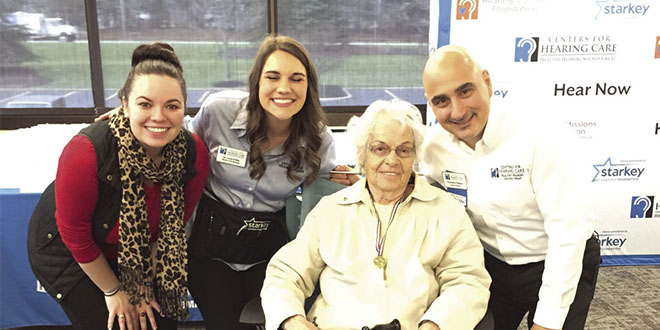02/09/2017
Survivors Receive Free Hearing Aids
- Share This Story

JFSA social worker Tayma Bislim, from left, Hearing Missions Foundation's Dr. Loribeth D'Elia, hearing aid recipient Ella Kieselstein and Hearing Missions Foundation's co-founder Fortunato Figliano at a free hearing aid program for Holocaust survivors at the Jewish Federation of Cleveland in Beachwood on Jan. 25.
Article reprinted with permission from Cleveland Jewish News
By Amanda Koehn
Holocaust survivors received free hearing aids at the Jewish Federation of Cleveland’s Jack, Joseph and Morton Mandel Building in Beachwood on Jan. 25, thanks to a partnership between the nonprofit Hearing Missions Foundation and Jewish Family Service Association of Cleveland.
“All of a sudden you hear everything,” said Ella Kieselstein, one of 34 local Holocaust survivors who received a set of hearing aids.
Hearing Missions Foundation staff, along with staff from Starkey Hearing Technology, held fitting and consultations for the survivors, who already had been selected to receive the hearing aids from JFSA. The survivors were also placed under the care of an audiology doctor.
Hearing Missions Foundation is the nonprofit affiliate of the Centers for Hearing Care, a Youngstown-based audiology practice. The foundation began in 2013 and fits people who have demonstrated need for free hearing aids, across Northeast Ohio and the world. Starkey donates hearing aids for its missions, which normally cost between $3,000 and $6,000 for a set. Fortunato Figliano, co-founder of Hearing Missions Foundation along with his wife Dr. Sheryl Figliano, said the mission serving survivors was one he will not forget.
“This one was the most unique one I’ve been on because we really wanted to be so sensitive to the population we were serving today,” Figliano said. “I was really surprised by how many people really opened up to me.”
Figliano said that the foundation became inspired to serve Holocaust survivors after seeing Starkey Hearing Foundation do a similar mission in New York City. He cold called JFSA asking if it could partner on the project. For JFSA, the call was welcome and much needed for a unique reason outside of simply improving hearing in an aging population.
“When older people lose some of their memory, they lose short term memory,” said Gilda Katz, Holocaust survivor program coordinator at JFSA. “So the older memories- the more traumatic memories – become more amplified,” adding that if survivors cannot hear, it is more difficult for them to engage with present activities and they are more likely to mentally divert to long-held, painful memories. Thus, being able to hear can have a major impact on a survivor’s mental state.
“I think I just had tears in my eyes all day – just beautiful stories,” Katz said.
For this reason and more, Katz and Figliano already committed to partnering again next year so another round of survivors can receive hearing aids.
Kieselstein, who a day after getting the hearing aids was still getting used to all the clear sounds around her, said she had always enjoyed music, especially that of Pyotr Ilyich Tchaikovsky, and for a long time had trouble hearing it fully.
“A person who doesn’t hear well, nobody can’t imagine what a horrible thing it is … to talk to somebody normally is out of this world,” she said, adding that people used to come to her Chester Township home and be surprised at how loud her television was.
Kieselstein said she never considered getting a hearing aid because of the high cost. However, the new set seems to be working out.
“It doesn’t show, nobody would know you have it, and you can hear so clearly,” she said.


Comments